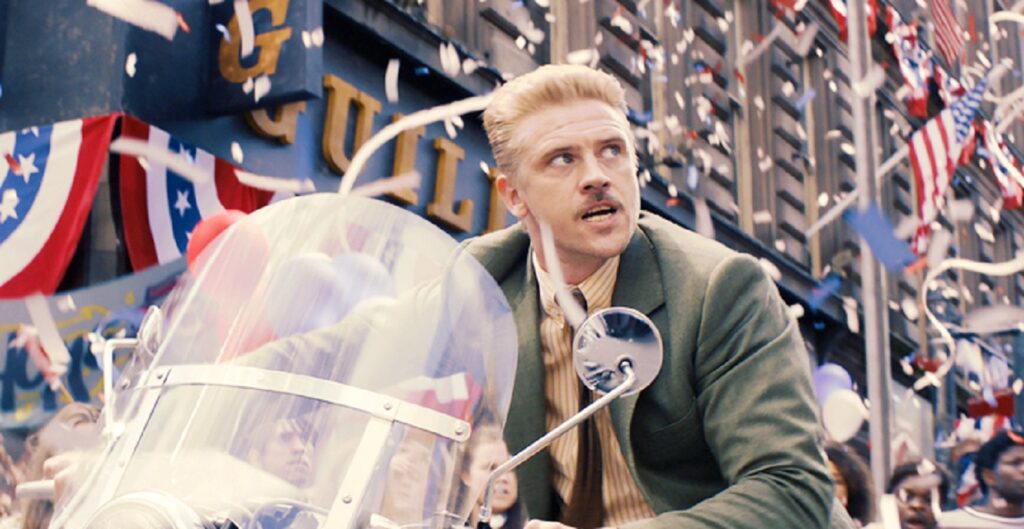
Today, I explain how weird the politics are in Indiana Jones and the Dial of Destiny.
This is Disgrace Distract and Bother Me, a feature where I just point out minor things that annoy me in pop culture. Basically, think of it like the lowest level of criticism, then Remember to Forget is the middle, where it’s like, “Okay, this is bad, but not, like, offensively bad” and finally, Things That Turned Out Bad is for, “This is seriously messed up.”
SPOILERS ABOUT INDIANA JONES AND THE DIAL OF DESTINY!
My friend Noah Berlatsky recently caused a bit of a stir with a perceptive article about Indiana Jones and the Dial of Destiny and how Nazis have become a sort of catchall villain in movies, but without ever actually explaining WHY they’re bad guys. They’re simply Nazis, so we know that they’re bad without the movies ever actually having the Nazi espouse the evil stuff that they believe in. As Noah argues, that makes it easier for people today who believe in similar things as the Nazis to distance themselves from the Nazis, since the Nazis in the movies are just cartoonish villains and not, you know, anti-Semites or whatever.
It’s an interesting argument, but what struck me about the discussion about Indiana Jones and the Dial of Destiny is that beyond that astute observation, the politics of the movie just didn’t make sense at ALL.
In the film, the Nazi villain, Jürgen Voller (Mads Mikkelsen) is working as a rocket scientist for N.A.S.A. under the name Schmidt (a clever commentary on Werner Van Braun, a Nazi scientist who was a major part of the United States’ space program, specifically the rockets used to take the astronauts to the moon in 1969), and in exchange, the government is aiding him in his pursuit of the Dial of Destiny. When that idea was introduced, I thought we might get some interesting political commentary. Instead…we did not.
I think we can assume that the U.S. government doesn’t actually believe that the Dial of Destiny has the ability to find holes in time, as Voller believes, but suffice it to say, the government is willing to help him find it as part of his deal to help the space program (the idea that they could just keep his identity a secret is a bit odd, but whatever, artistic license). However, Agent Mason of the C.I.A. (Shaunette Renée Wilson), who had been helping Voller up until this point (even when his henchmen started killing innocent civilians) tries to stop their plans before she is killed and Voller and his two main henchmen, Klaber (Boyd Holbrook, the guy in the featured image for this article) and Hauke (Olivier Richters) and some other henchmen try to go back in time to kill Hitler in 1939 and take control of Nazi Germany.
And that’s pretty much it in terms of how much the film talks about the politics in the film. How is Voller going to take control of Nazi Germany with his small group of (AMERICAN!) shock troops after he kills Hitler? No idea. Why would the Nazis of 1939 follow him after he kills Hitler? No clue. Why would anyone even know who he is when the 1939 Voller would be a much younger man? Dunno. What is Voller’s problem with Hitler besides the fact that Fuller knows Hitler is going to lose? No idea. Who are Klaber and Hauke? Beats me. What are their motivations for going back in time and becoming literal Nazis? I don’t have the foggiest idea. What branch of the government do they work for? Unclear. Why is the U.S. Government allowing Voller to form his own sort of paramilitary unit? I don’t know.
Voller is the bad guy, and Klaber and Hauke and some other unnamed guys are his henchmen and they plan to go back in time, kill Hitler and take over Nazi Germany and that’s….it. The movie is two hours and thirty four minutes long. NONE of this could be explained in the actual movie? Klaber couldn’t have a single line explaining to us why some dude from the South (who doesn’t even speak German yet, as he is studying in the film) wants to go be a Nazi in the past?
It’s so odd. Holbrook is a good actor and he is captivating in his henchman role, but man, it is so weird how none of the politics involved in the film have been given even the slightest bit of lip service. I still enjoyed the movie, honestly, but boy, it was such an odd decision to just not go into ANY of this stuff.
Feel free to e-mail me at my all-new, much shorter e-mail address, brian@poprefs.com, for suggestions for pet peeves of your own. They might match mine, and I’ll run them!










Some of us are going to see it next week, followed by Dinner. Gonna wait to see if your questions come up. If not I’ll say ” Online, Brian Cronin wondered about..” and see if they feel the same.
I’d bookmarked this to look at after I saw the movie; several of your points occurred to me too, like the CIA agents apparently gunning down random civilians. I can buy Voller wanting to take out Hitler: the Fuehrer made a lot of bad calls and convincing him of the truth would be difficult (there’s a Czech comedy in which a group of Nazi officers go back and try but fail miserably). But yeah, why would everyone immediately appoint him Fuehrer? It’s not like they didn’t have a bunch of ambitious cutthroats who’d think “Hitler is dead! My time has come!”
As for the Nazis as generic villains, a friend of mine made the same point about the Soviets: in most movies they’re evil bad guys who hate America, no different from Hydra or SPECTRE, that’s all we need to know. I touched on the subject in a book I wrote a few years ago (Screen Enemies of the American Way).
I wonder if I’m the only comics nerd who looked at the title and imagined Indy dialing H … E … R … O
Thanks for sharing this with us! Some really amazing features.Good contest , it’s really helpful for new bloggers. All the best guys Thank you for your post. This is excellent information. To get new information visit here.